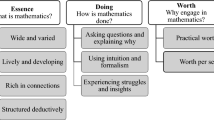Abstract
We believe that professional mathematicians who teach undergraduate mathematics courses to prospective teachers play an important role in the education of secondary school mathematics teachers. Thus, we explored the views of research mathematicians on the mathematics that should be taught to prospective mathematics teachers, on how the courses they teach can serve teachers in their work with school students, and on the changes they would implement if their courses were designed specifically for prospective teachers. We constructed profiles of the four mathematicians based on their responses to a clinical interview. We employed the construct of mathematics teacher-educators’ triad in the reflective analysis of our findings and extended the construct based on the results of this study. In conclusion, we commented on potential ways to draw stronger connections between university mathematics and the mathematics taught in schools.


Similar content being viewed by others
Notes
We number the interview excerpts for future reference.
References
Abstracts of papers presented at MathFest. (2009). Portland, OR. MAA. Available: http://www.maa.org/abstracts/.
Abstracts of papers presented at MathFest. (2010). Pittsburgh, PA. MAA. Available: http://www.maa.org/abstracts/.
Artigue, M. (1998). Research in mathematics education through the eyes of mathematicians. In A. Sierpinska & J. Kilpatrick (Eds.), Mathematics education as a research domain: A search for identity (pp. 477–489). Dordrecht: Kluwer.
Ball, D. L., Thames, M. H., & Phelps, G. (2008). Content knowledge for teaching: What makes it special? Journal of Teacher Education, 59(5), 389–407.
Blanton, M. L., & Stylianou, D. A. (2009). Interpreting a community of practice perspective in discipline-specific professional development in higher education. Innovations in High Education, 34, 79–92.
Burton, L. (2004). Mathematicians as enquirers: Learning about learning mathematics. Dordrecht, the Netherlands: Kluwer.
CBMS: Conference Board of the Mathematical Sciences. (2001). Mathematical education of teachers. In Issues in Mathematics Education (Vol. 11). Providence, RI: American Mathematical Society.
Jaworski, B. (1992). Mathematical teaching: What is it? For the Learning of Mathematics, 12(1), 8–14.
Jaworski, B. (1994). Investigating mathematics teaching. London, UK: Falmer Press.
Jaworski, B. (2003). Sensitivity and challenge in university mathematics teaching. Educational Studies in Mathematics, 51, 71–94.
Jaworski, B., Mali, A., & Petropoulou, G. (2015). Approaches to teaching mathematics and their relation to students’ mathematical meaning making In The Proceedings of the 39rd Conference of the International Group for the Psychology of Mathematics Education (Vol. 3, pp. 97–104). Hobart, Tasmania: PME.
Latiolais, M. P., O’Halloran, J., & Cakebread, A. (2006). Surveying majors in developing a capstone course. In L. A. Steen (Eds.) Supporting Assessment in Undergraduate Mathematics (pp. 171–176). Mathematical Association of America. Available at: www.maa.org/saum/cases/SAUM-Report-11-05.pdf.
Nardi, E. (2008). Amongst mathematicians: Teaching and learning mathematics at University level. Berlin: Springer.
Patton, M. Q. (2002). Qualitative research and evaluation methods. Thousand Oaks, CA: Sage.
Rowland, T., & Ruthven, K. (Eds.). (2011). Mathematical knowledge in teaching. Berlin: Springer.
Ruthven, K. (2011). Conceptualising mathematical knowledge in teaching. In T. Rowland & K. Ruthven (Eds.), Mathematical knowledge in teaching (pp. 83–98). Dordrecht: Springer.
Schoenfeld, A. (2000). Purposes and methods for research in mathematics education. Notices of the American Mathematical Society, 47(6), 641–649.
Selden, A. (2002). Two research traditions separated by a common subject: Mathematics and mathematics education. Technical report. Available: math.tntech.edu/techreports/TR_2002_2.pdf.
Sfard, A. (1998a). A mathematician’s view of research in mathematics education: An interview with Shimshon A. Amitsur. In A. Sierpinska & J. Kilpatrick (Eds.), Mathematics education as a research domain: A search for identity (pp. 445–458). Dordrecht: Kluwer.
Sfard, A. (1998b). The many faces of mathematics: Do mathematicians and researchers in mathematics education speak about the same thing? In A. Sierpinska & J. Kilpatrick (Eds.), Mathematics education as a research domain: A search for identity (pp. 491–512). Dordrecht: Kluwer.
Sierpinska, A., & Kilpatric, J. (1998). Continuing the search. In A. Sierpinska & J. Kilpatrick (Eds.), Mathematics education as a research domain: A search for identity (pp. 527–548). Dordrecht: Kluwer.
Sultan, A., & Artzt, A. F. (2010). The mathematics that every secondary school math teacher needs to know. Routledge Series Studies in Mathematical Thinking and Learning. New York, NY: Routledge.
Usiskin, Z., Peressini, A., Marchisotto, E. A., & Stanley, D. (2003). Mathematics for high school teachers: An advanced perspective. New Jersey: Prentice Hall.
Wagner, J. F., Speer, N. M., & Rossa, B. (2007). Beyond mathematical content knowledge: A mathematician’s knowledge needed for teaching an inquiry-oriented differential equations course. Journal of Mathematical Behavior, 26, 247–266.
Weber, R. P. (1990). Basic content analysis. Thousand Oaks, CA: Sage.
Zaslavsky, O., & Leikin, R. (2004). Professional development of mathematics teacher-educators: Growth through practice. Journal of Mathematics Teacher Education, 7, 5–32.
Zazkis, R., & Leikin, R. (2010). Advanced mathematical knowledge in teaching practice: Perceptions of secondary mathematics teachers. Mathematical Thinking and Learning, 12, 263–281.
Author information
Authors and Affiliations
Corresponding author
Rights and permissions
About this article
Cite this article
Leikin, R., Zazkis, R. & Meller, M. Research mathematicians as teacher educators: focusing on mathematics for secondary mathematics teachers. J Math Teacher Educ 21, 451–473 (2018). https://doi.org/10.1007/s10857-017-9388-9
Published:
Issue Date:
DOI: https://doi.org/10.1007/s10857-017-9388-9




